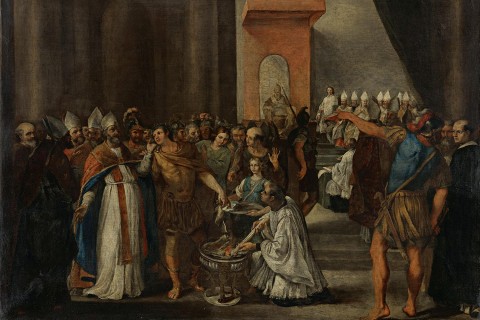Advent 1C (Luke 21:25-36)
Advent stands at odds with the tranquility our culture hopes for this time of year. The coming of the Son of Man will yank us off the hamster wheel of life.
Look at the fir tree and all the evergreens. As soon as they sprout ornaments, you can see for yourselves and know that Christmas is already near.
For many people, this is not the beginning of a season of expectation. By the first Sunday of Advent, the culture has beaten the church to the punch. We’ve long known that Christmas is imminent—our capitalist society has been telling us at least since September, when the days left for Christmas shopping dipped into the double digits. Hurry up and buy!
The signs are everywhere: December 25 is coming. Maybe this excites us, as we picture idyllic winter landscapes and family gatherings replete with laughter, gifts, crackling fires, and beautifully decked halls. Or perhaps we’re nervous, trying to figure out how to rob Peter to pay Paul so that we can afford the gifts under the tree. For some, this time of year magnifies the dysfunction of fractured families, the absence of warm family gatherings. Others grieve the recent (or not so recent) loss of a loved one who always made this time of year enjoyable, making their absence especially palpable. The signs are there to remind us of all these things.
So, what of Advent? When it comes to looking forward to Christmas, our culture needs no help from the liturgical year. But Advent directs our attention to different signs—signs with which the culture tends not to concern itself because they are uncomfortable to consider. Culture looks toward the sentimentality of Christmas; Advent looks toward the shifting of culture’s own paradigms. Culture assumes a rather shallow display of good will and emotional warmth; Advent demands good will of systems that aren’t, by their design, predisposed to it. Culture hopes for an economic boost to keep itself aloft; Advent looks toward an economy that is just.
This week’s Gospel text comes from Jesus’ eschatological discourse in Luke 21, which comes right after he witnesses a widow putting “all she had to live on” into the treasury of the temple. He describes what he sees in terms of the income disparity within the cultural system. Then he turns his attention to the system itself. The temple, Jerusalem, and even nations are all subject to upheaval. These prized, lovely, celebrated elements of culture are no less ephemeral than the figs that appear on fig trees every year. Eventually, everything has got to go.
According to this passage, the coming of the Son of Man—much like Amos’s day of the Lord—will be anything but sentimental and lovely. It will be great and terrible. Even nature itself will be disrupted. The world will be thrown into distress by signs revealed in the sun and moon and stars, in the roaring waves of the sea. But, counterintuitively, these frightening things will signal the arrival of redemption.
Advent stands at odds with the pristine beauty and tranquillity that culture hopes for this time of year. Industry has been preparing to have everything in place. It has worked diligently on its store window displays and sales campaigns. It has chosen the right colors, the right scents, and the right textures to evoke familiar feelings and lull us back into familiar concerns.
Advent seeks to snap us out of that. The Son of Man’s arrival comes without tranquillity. Instead, it yanks us off the hamster wheel of life. It calls us away from the distractions of our trappings and our revelry. It competes with culture’s insistence that everything is great and we should continue on as we are, without care.
And it challenges so many things that are familiar to us, areas where we are comfortable and complacent: The proliferation of violence in our society. Income disparity, poverty, and the fact that such a thing as the “working poor” can even exist. Our disdain for the stranger among us. Sexism in the workplace, in health care, and in the public square. Our corrections system’s devastating effect on the poor, immigrants, and families of color—and our economic dependence on this system as a source of cheap labor. The misunderstanding and mistreatment of people who fall outside binary norms. The assumed supremacy and normativity of a relatively small group of people.
The coming of the Son of Man challenges our comfort and familiarity with the systems we navigate every day. The righteous branch springing up from David comes as an agent of justice—bad news for all that is unjust. And if we are honest, we all participate in unjust systems and often benefit from them.
The eschatological tone of the assigned Advent texts is quite appropriate for the times in which we are living. They call us to anticipate a dramatic paradigm shift, one that may well challenge the systems and structures we hold dear. The things that have pacified us for so long can expect to be overthrown in favor of true justice. Now is the time for redemption, of the downtrodden and oppressed but also of entire systems—and of those of us who benefit from them, that all of us may participate in God’s will on earth as it is in heaven.





